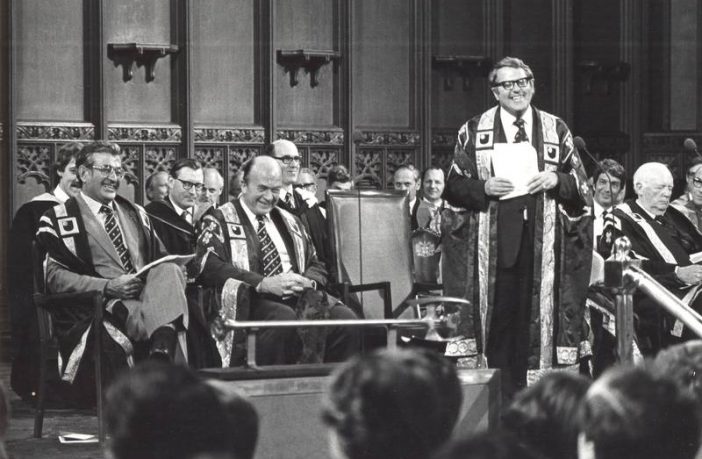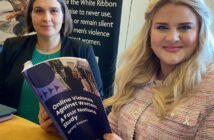Former OU Chancellor Asa Briggs will always be remembered as one of the most important historians in Britain, world-renowned for his work in social history, culture and communications and a ‘towering figure’ in the world of education. Much less well known is that he was also a writer of poetry.
Just a fortnight before his death, and with a book of poems being published next month, Asa –who would have turned 95 in May – spoke to Lucian Hudson, OU Director of Communications, about his inspiration, the secrecy, and where it all began…
What inspired you to write poetry?
I have always been fascinated and engrossed by poetry and by English literature, together with my passion for history and for economic thought too. These interests have never waned. And so my writing – both of history and of poetry – has never stopped. Nor has my interest in language and expression ever diminished.
When did you start writing poetry?
In the sixth form at Keighley Boys’ Grammar School I produced for my own pleasure in 1937 a school exercise book, very neatly written, called Collected Poems. Parts of this are reproduced in facsimile in the new book.
The first poem was written in 1933, when I was 12; the last in 1937, the year before I became an undergraduate at Sidney Sussex College Cambridge. This was a political poem, which I have included as the fifth poem in my collection. It dealt with the German bombing of the Basque town of Guernica. Keighley gave a welcome to Basque children whom I got to know when they arrived. Some of them were of my own age. Of course, I had never heard of Picasso or of his great painting. I did not know that he was born in Galicia before he moved to Barcelona. At Sidney Sussex College I did not write any poems. But I read a lot of poetry and immensely strengthened my knowledge of it.
Why did you keep it a secret for all those years?
I have written poems since I was a pupil in Keighley Boys Grammar School in the 1930s. I am still writing them in my own nineties. Yet very few people, even members of my own family, knew this. The reason is that I have kept secret my writing of them.
Until the new book was produced, I have had only two of my poems published, the first of them in The Keighlian, my school magazine, in 1936. The second came out in most unusual circumstances in Hangzhou. A soldier/guard approached me at Hangzhou Airport in April 1989. I had a pen in my hand, and he asked me what I was doing. When I replied, ‘writing a poem’ he smiled and asked me if he could have a copy of it when I had finished it. When I gave the copy to him, he has said proudly that he would have it published in the local newspaper. He also asked me if we could be photographed together. And so we were, with a sign reading, ‘Strictly No Photography’ not far away from my wife Susan’s camera. I wrote a lot of poetry about China when I was visiting there. And other work has always reflected my interest in contemporary social and political affairs.
Most of the poems I wrote after the war were not so neatly written and so carefully arranged as those I included in the stiff-backed Keighley Grammar School exercise book. My new poems were scribbled on odd pieces of notepaper, or more often on the scrappy remnants of hotel paper. The latter, usually without notes or dates, are revealing in that they show how much places as well as people meant to me.
Why now? Why abandon the secrecy and publish a book of poems?
That I have abandoned any elements of secrecy in the new book, is entirely due to one person, my publisher John Spiers. An old pupil of mine, a friend for 50 years now, and the first publisher of my Collected Essays at The Harvester Press, he told me that he was starting a new publishing company, Edward Everett Root Publishers Co. Ltd in Brighton, and that he would like me to write the first book for his new firm. I suggested a volume of poems and he responded with enthusiasm at once. This book, he said, would be “both a literary and historic event!” The effect of my willingness to do so, is that curiously I have written more poems since I agreed to write this book than I had written in the previous 10 years.
I have always focussed my work on inter-disciplinary studies, which were at the very heart of all my work at Oxford, at Leeds, at the new University of Sussex and at The Open University from the beginning. The fundamentals of thought, analysis, education, democracy, the arts, and personal development are all closely intertwined – and are our best guide in life.
Can anyone write poetry?
Yes. Listen to the individual voice within.



